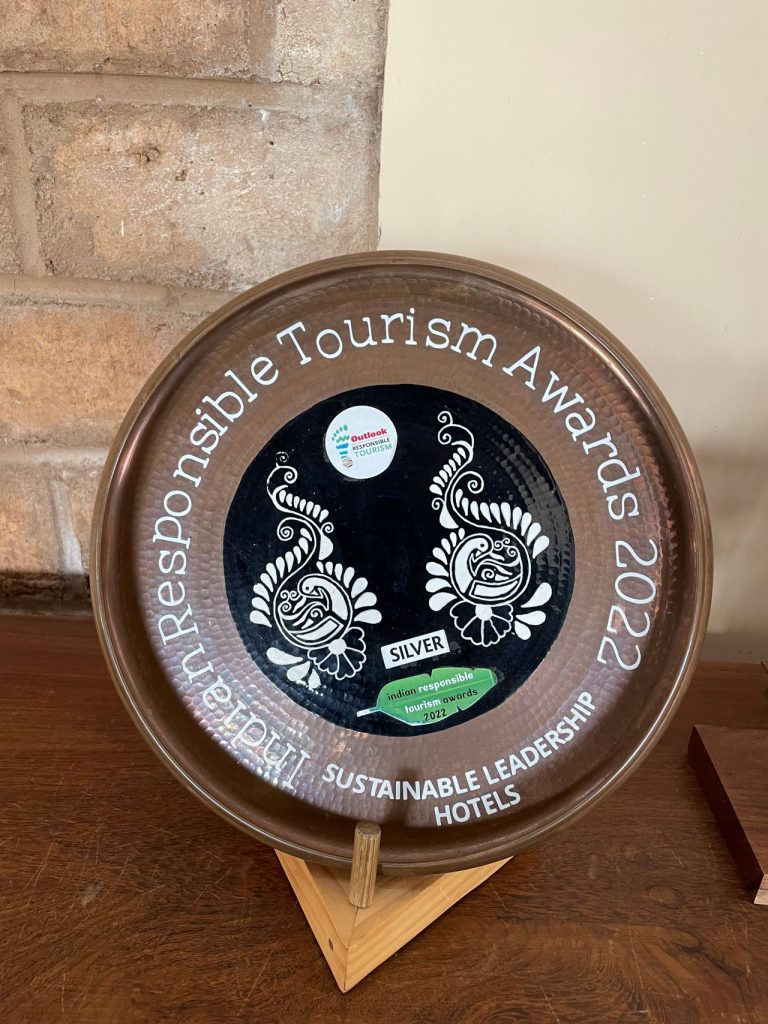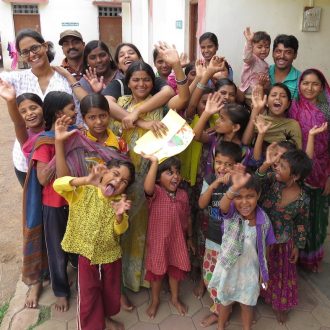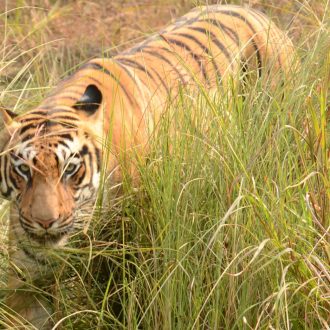Waghoba Eco Lodge Tadoba by Pugdundee Safaris
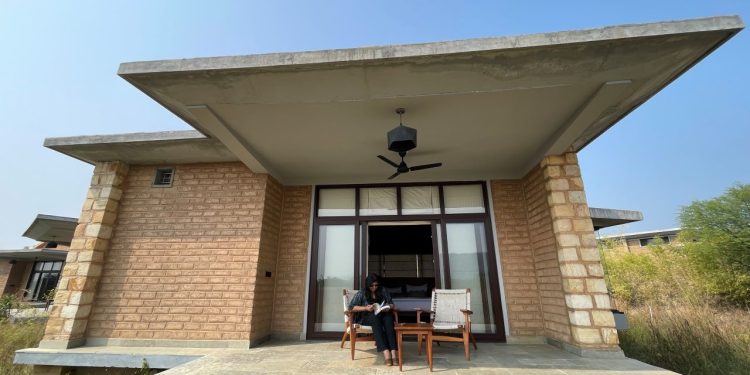
It’s dark and nippy and as my eyes get used to the shadows of the dense undergrowth and the outlines of the clusters of tall grass standing as sentinels in the wilderness, I suddenly see a pair of eyes boring into mine amidst a clearing in the clump of bushes. I switch on my flashlight to see the life-like eyes of Waghoba, the deified tiger looking upon me with a solemn stare. I realize that I am standing on hallowed ground. This is the shrine of Waghoba, the tiger or Wagh who is worshipped by the Gonds in the tribal heartland around Tadoba National Park. “You will find many stone figurines of tigers with tridents surrounding them in the forests and villages, says Mayuresh Joshi, the naturalist at Waghoba Eco Lodge interrupting my reverie. The Waghoba Eco Lodge where I am staying is one of the most sustainable safari lodges, located in the buffer zone of the Tadoba Andhari Tiger Reserve. It takes its name from the revered tiger and pays its veneration to the mighty creature and it is only apt that I seek the blessings of this respected deity before I set out for my maiden safari in the Tadoba National Park, hoping for a glimpse.
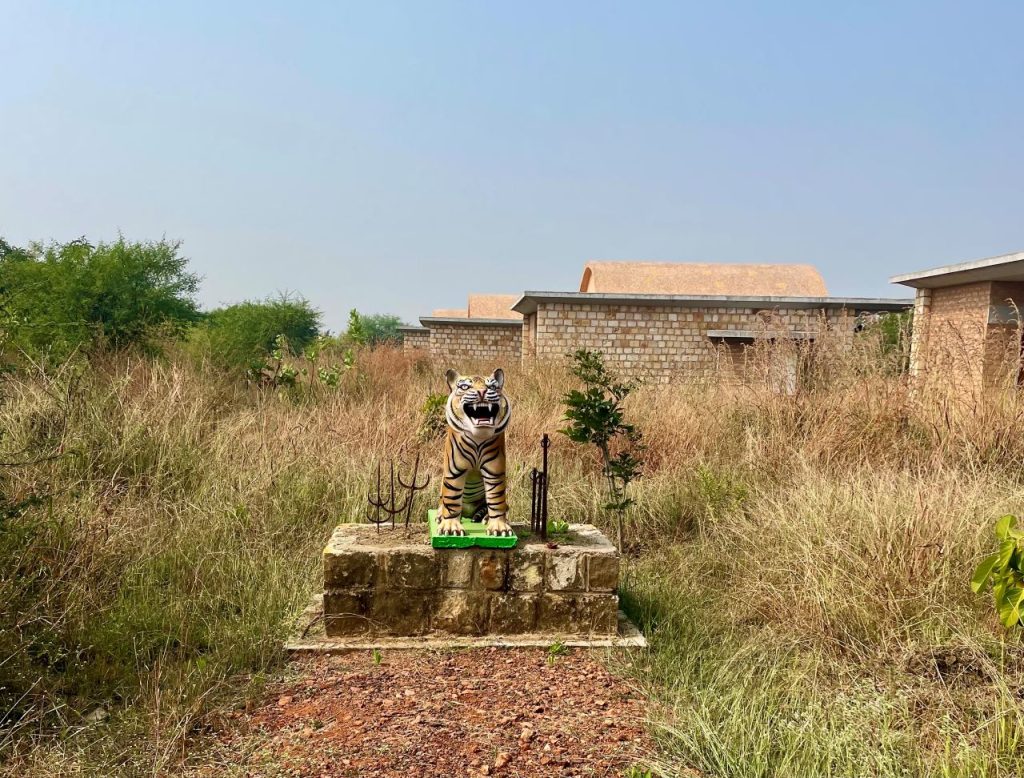
Waghoba Eco Lodge is the latest in the stable of sustainable safari lodges from Pugdundee Safaris and the first in Maharashtra, located in the buffer zone of the Tadoba National Park. It is also one of the most eco-friendly among Tadoba Tiger Reserve hotels and wildlife lodges. This is my first time at Tadoba and I am hosted by Pugdundee Safaris in this new wildlife lodge that is the poster child of sustainability and conscious luxury. Lost amidst 12 acres of wilderness, the first thing I feel is the sheer earthiness and the raw and rustic landscape with a smattering of native trees surrounded by unbridled grasslands and shrublands.

For a moment I feel like I am in the middle of nowhere. The closest village is a few miles away and you are just girdled by the jungle. The stripes may be anywhere as invisible eyes may be watching me but then at Waghoba Eco Lodge, the majestic tiger is virtually ubiquitous everywhere – be it a painted stone deity or as a stuffed toy, the pugmarks on the floor, or the artwork on the walls.
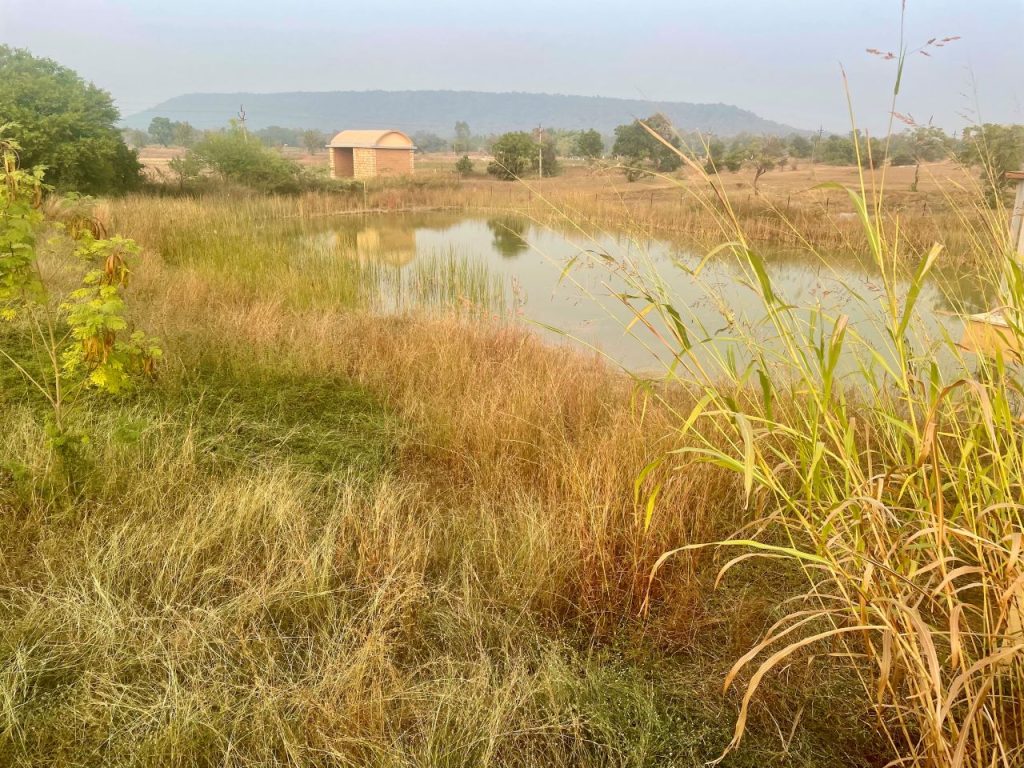
We reach Waghoba Eco Lodge after a five-hour drive from Pench Tree Lodge located in Pench National Park, as we cross the border from Madhya Pradesh to Maharashtra. The lodge is closer to Nagpur as it’s about a couple of hours from the city, which has an international airport as well while the 8-lane Nagpur – Hyderabad Highway makes the journey rather comfortable. The closest railhead is at Chandrapur which is about an hour away and the village is Wadala Tukum in the Bhadravati taluk in Chandrapur. 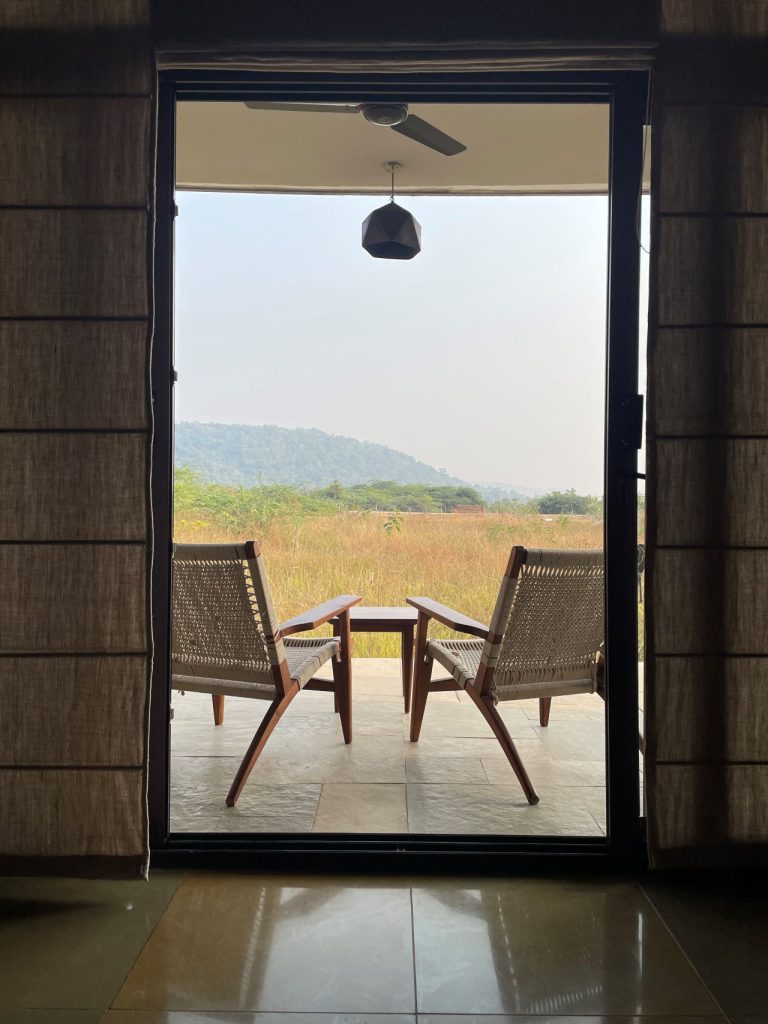
“Sometimes wildlife comes calling right here, near our lodge, ” says General Manager Ghanshyam Singh, as he explains the many gates and zones of Tadoba National Park. Waghoba Eco Lodge is close to Khutwanda Gate of the Tadoba National Park, which is barely 20 minutes away. Most of the Tadoba tiger reserve hotels are located near other gates and zones but Waghoba Eco Lodge stands out from the rest in terms of its focus on both tourism and conservation. Standing there in the reception and sipping my welcome drink, I am lost in the open tract of land spread out in front of me as I look out of the large open window, which frames the wild landscape. The vast open grasslands, indigenous trees and native shrubs skirting a lake brimming with birds greet me and I feel overwhelmed amidst the untamed wilderness

Unlike Pench Tree Lodge, which has a dense canopy of woodlands, Waghoba Eco Lodge opens into the raw and rough outdoors, untamed and untraversed, nature in its own pristine self. The winds set the trees in motion as they sway to their rhythm. I see a pair of bee-eaters and a red-vented bulbul flitting around the bushes, while a few pipits merge with the landscape.
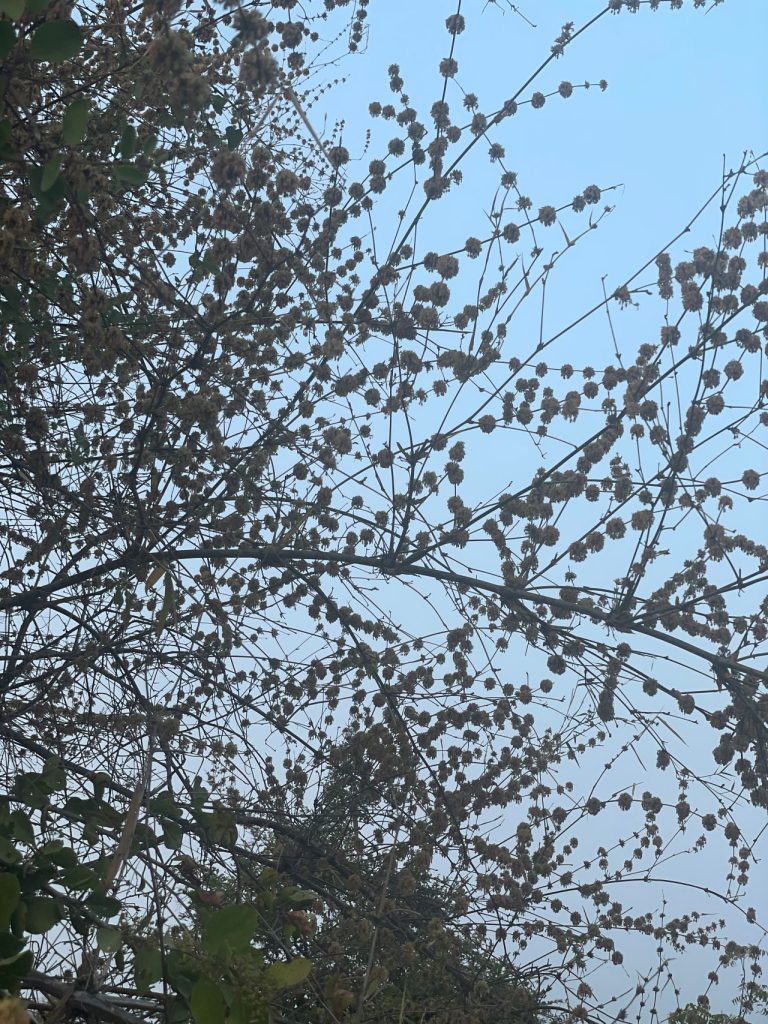
” A pair of foxes live near the property, ” adds Mayuresh as we go for a walk around the campus, watching the sun squint through the trees while we look for more birds. The ecosystem and the biodiversity have been preserved and restored, wherever needed. While some of the native trees have been here for years, some local flora has been planted, so that the biodiversity has been maintained. Perhaps this is why Waghoba Eco Lodge ranks very high in the list of sustainable safari lodges located around Tadoba Tiger Reserve,
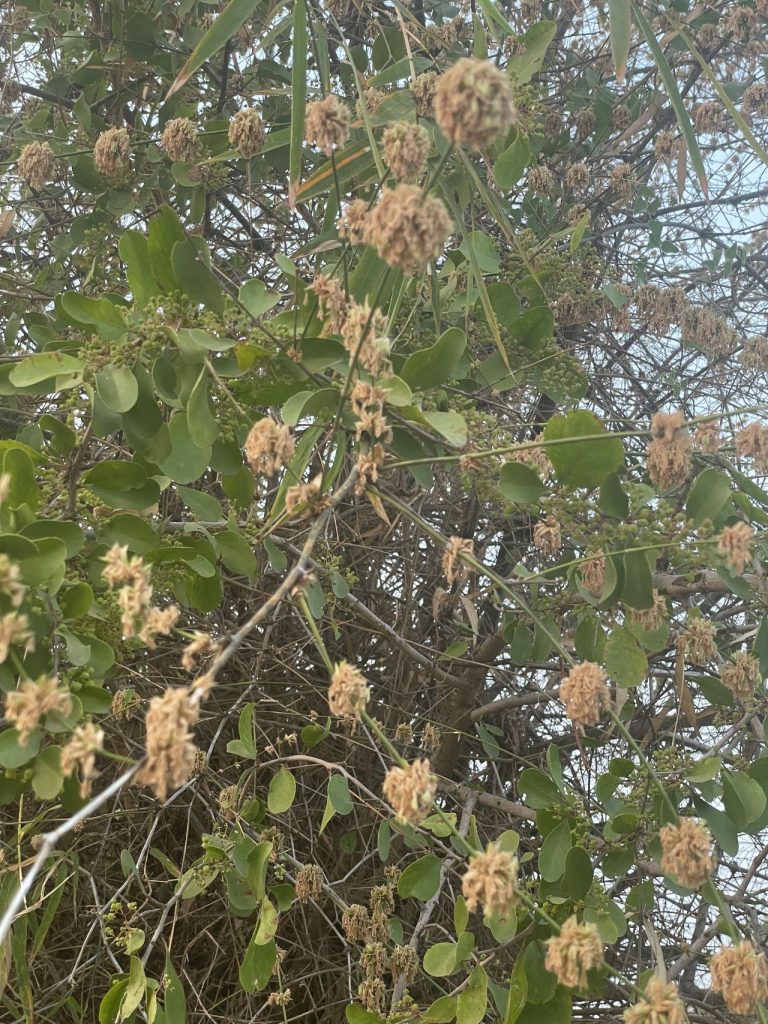
“The bamboo is in bloom, a phenomenon that happens once in 40-50 years. There are many trees like teak, mahua, tendu, crocodile bark , jamun, shisham and palash here. The Palash will soon bloom in spring and summer painting the landscape red, ” says Mayuresh. I make a mental note to come back soon.
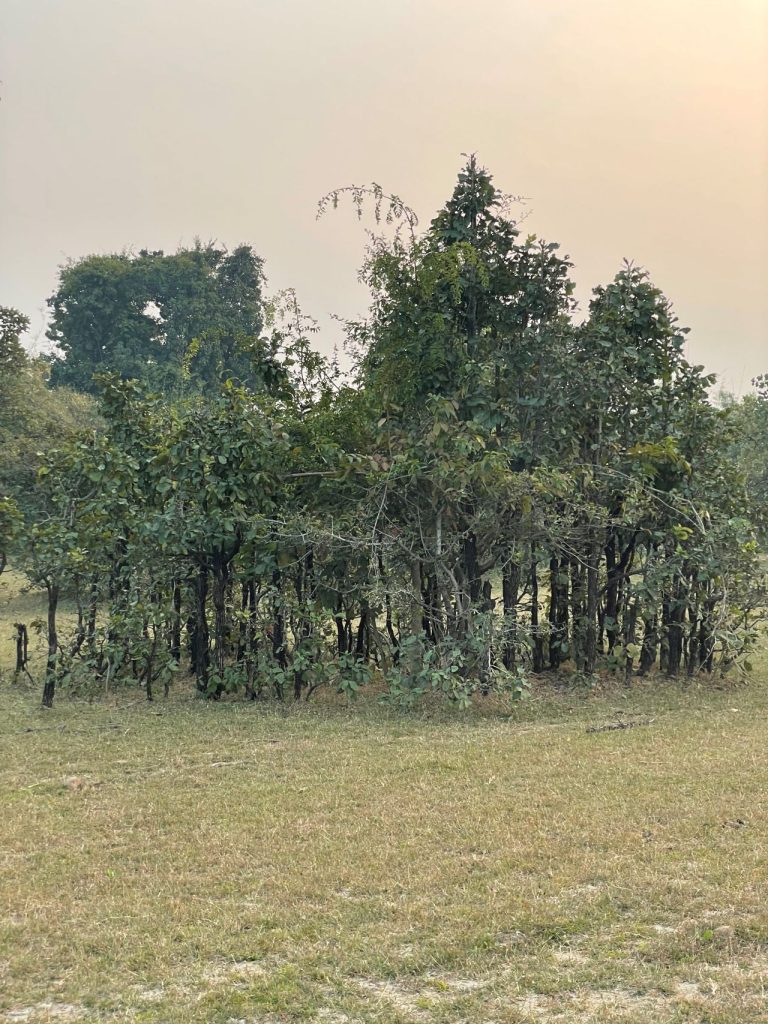
Accommodation
The entire landscape around Waghoba Eco Lodge is painted in hues of gold, yellows, browns, and greens and the lodge blends so effortlessly with the landscape with the use of local materials like sandstone on the facade and handmade adobe bricks that tinge the walls with these natural hues. You almost get a feeling that you are a part of the landscape, as there seems to be no interruption or disturbance to the environs. The wildlife eco-lodge just blends seamlessly with the natural ecosystem, making it one of the best sustainable safari lodges among other Tadoba Tiger Reserve hotels.
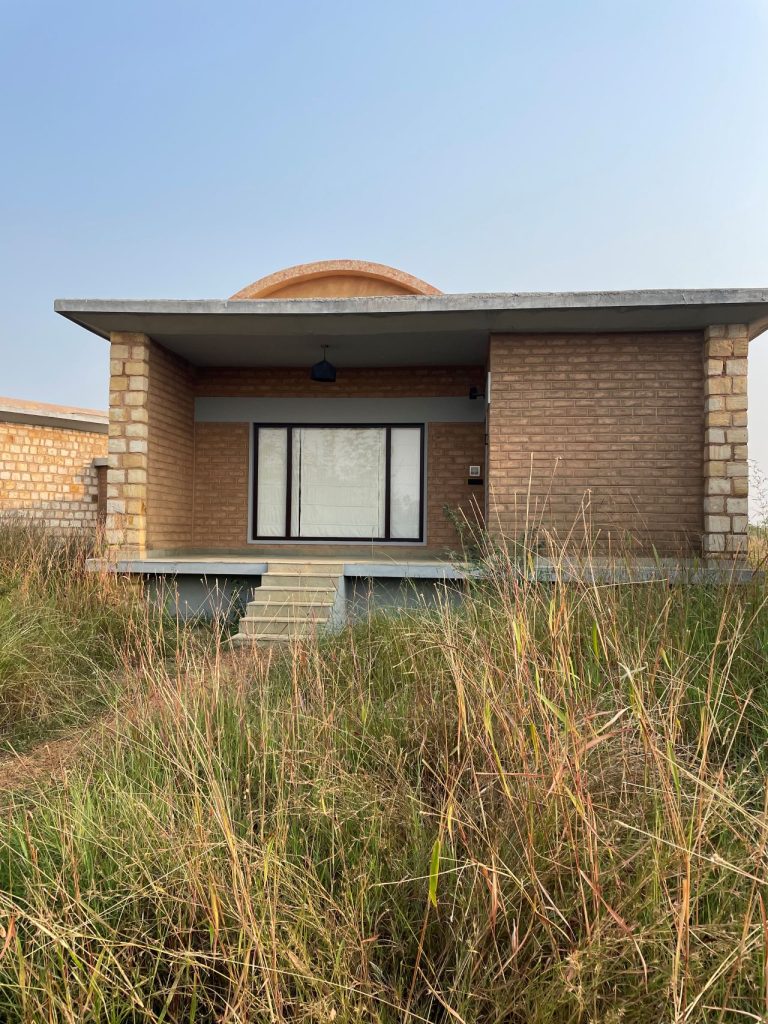
There are 14 exclusive luxury cottages and the emphasis is on conscious luxury and sustainability. While the architecture is designed by Bangalore-based Biome Solutions which has sourced all the indigenous elements and materials locally, the design is inspired by the tribal villages and local aesthetics, keeping in mind the eco-construction and the wild ecosystem
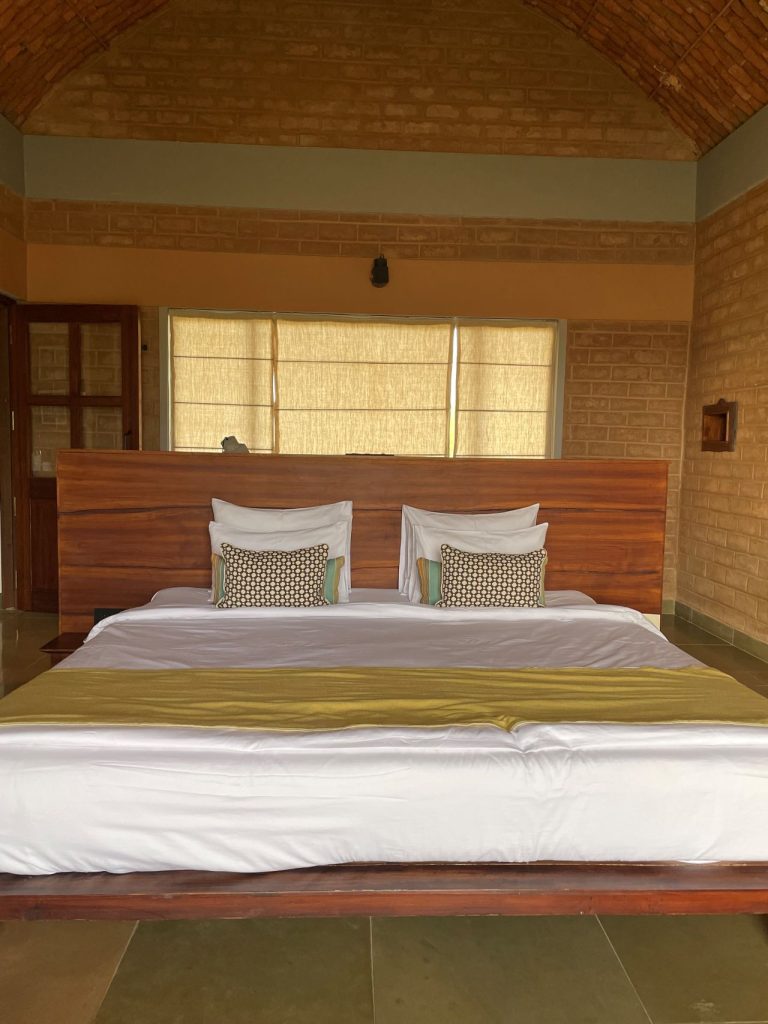
The first thing that I see when I enter my one-bedroom cottage is the ceiling stacked with Guna vault roof tiles. Along with the handmade adobe bricks, they are laced with broken ceramics, mosaics, and stonework. And the rooms are atmospheric and rustic, yet luxurious. There is handcrafted furniture made with teak wood and the walls are filled with illustrations that give you a peek into tribal life and wildlife.
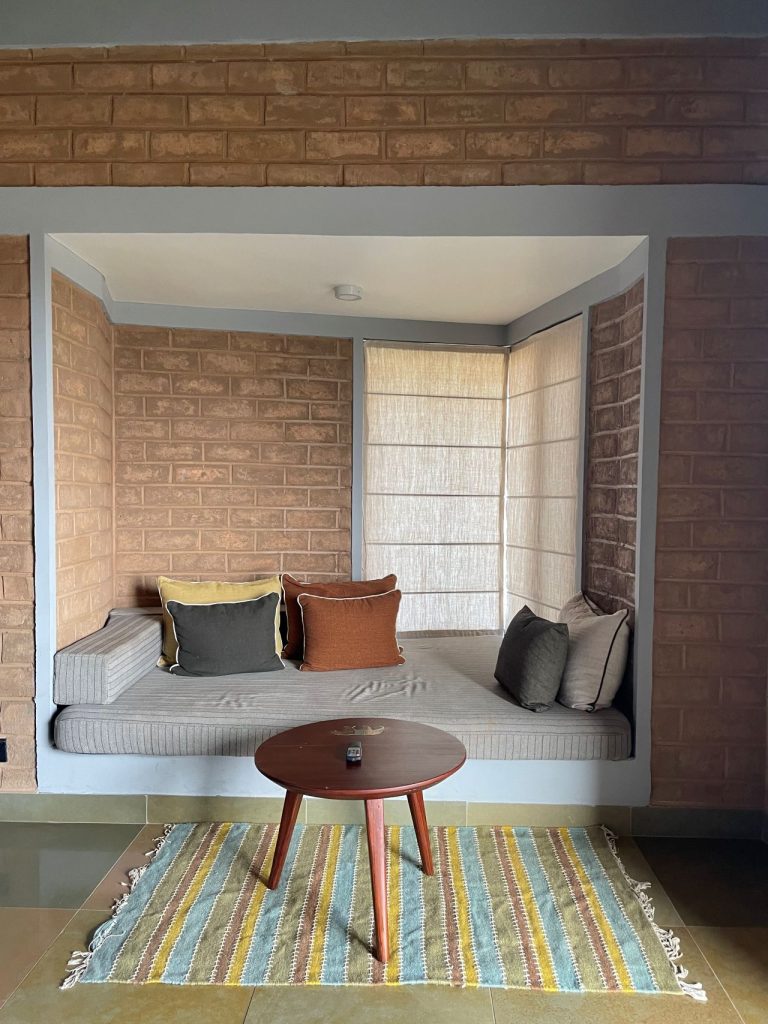
The tiger is ubiquitous as it is present in different forms in the decor. There is a large bathroom with a skylight and organic and green toiletries with no plastic – even the toothbrush and paste are natural. My favourite part of the room is the deck which gives me a feeling of being part of the outdoors, even as I laze in bed and watch dawn break or the sun calling it a day.
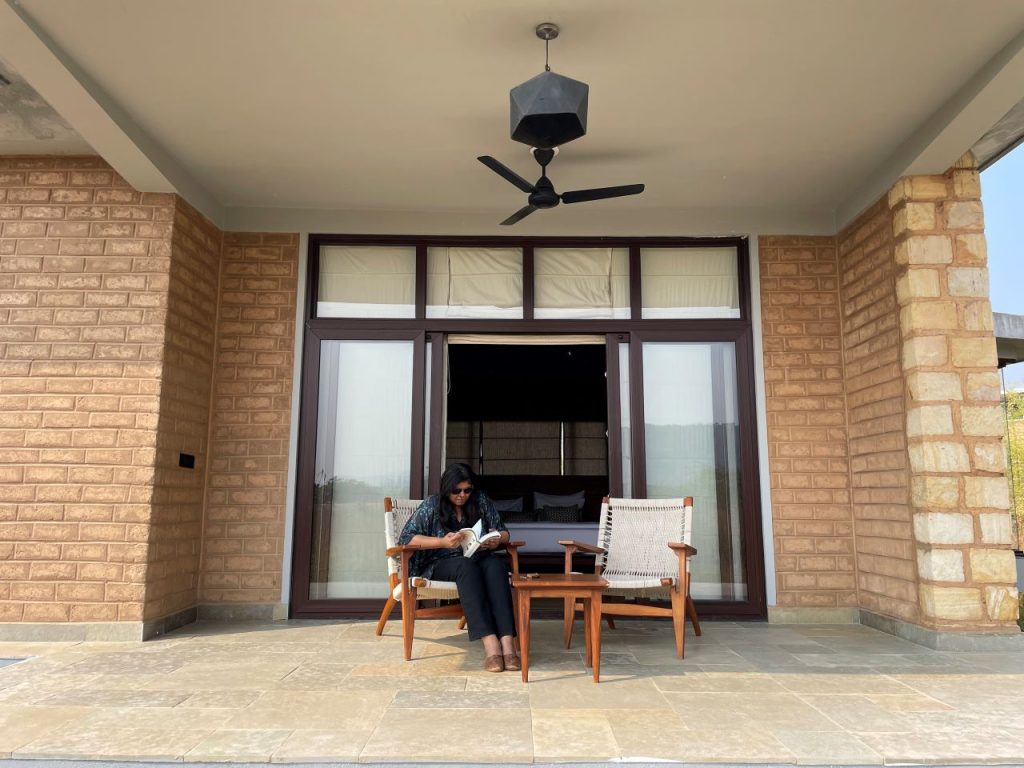
The lodge is clad in earthy tones and has a relaxed vibe and offers a wild and secluded experience. There are several cozy nooks for reading or ruminating and a cheerful photography hide to get up close to birds and wildlife without disturbing them. A large shaded swimming pool with a sundeck, a nature library, a lounge area, a restaurant, and a responsible souvenir shop are some of the facilities here. There is even a presentation room with daily interactions with naturalists and wildlife and other documentaries on conservation and on social enterprises are screened here for guests as well.
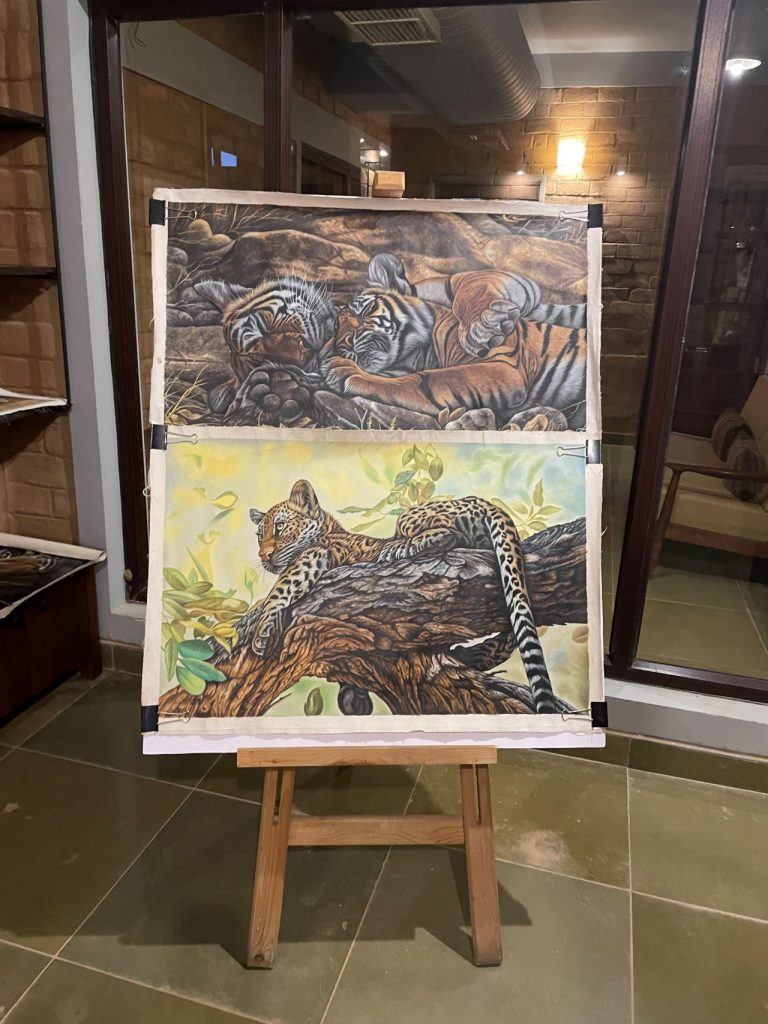
Cuisine
Waghoba Eco Lodge, like every other wildlife lodge of Pugdundee Safaris, serves local, traditional, authentic cuisine literally on a platter – the only difference being, the plates here are etched with illustrations of tiger paws. In fact, that’s the first thing that I see when I enter the dining room. And of course, the tiger has got to be everywhere.
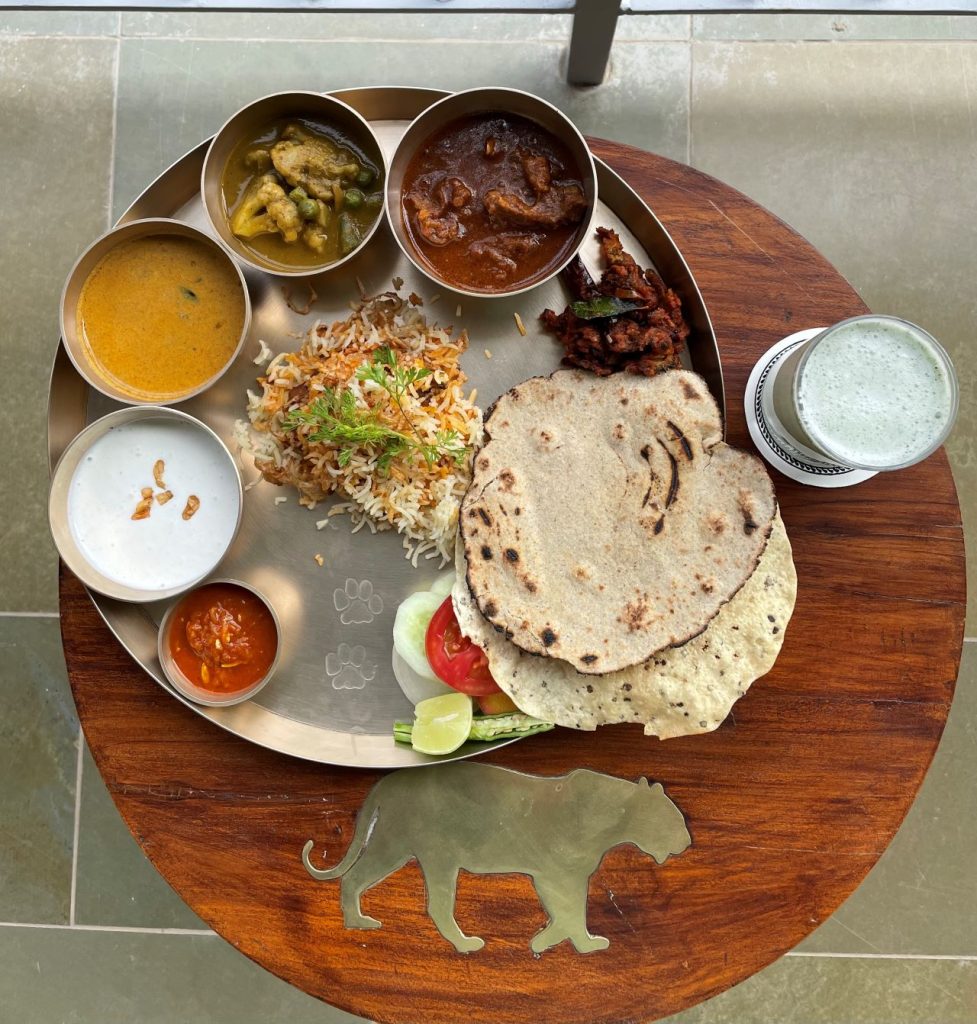
The always smiling and enthusiastic Chef Ark Bagchi loves to experiment even as he prepares local and authentic dishes, be it the wholesome Varadhi Thaali, the delectable Maharashtrian Thali, or the spicy Hyderabad thali. But it’s not all about thalis. From yummy sabudaana khichdi to batata vada, every dish is absolutely divine.
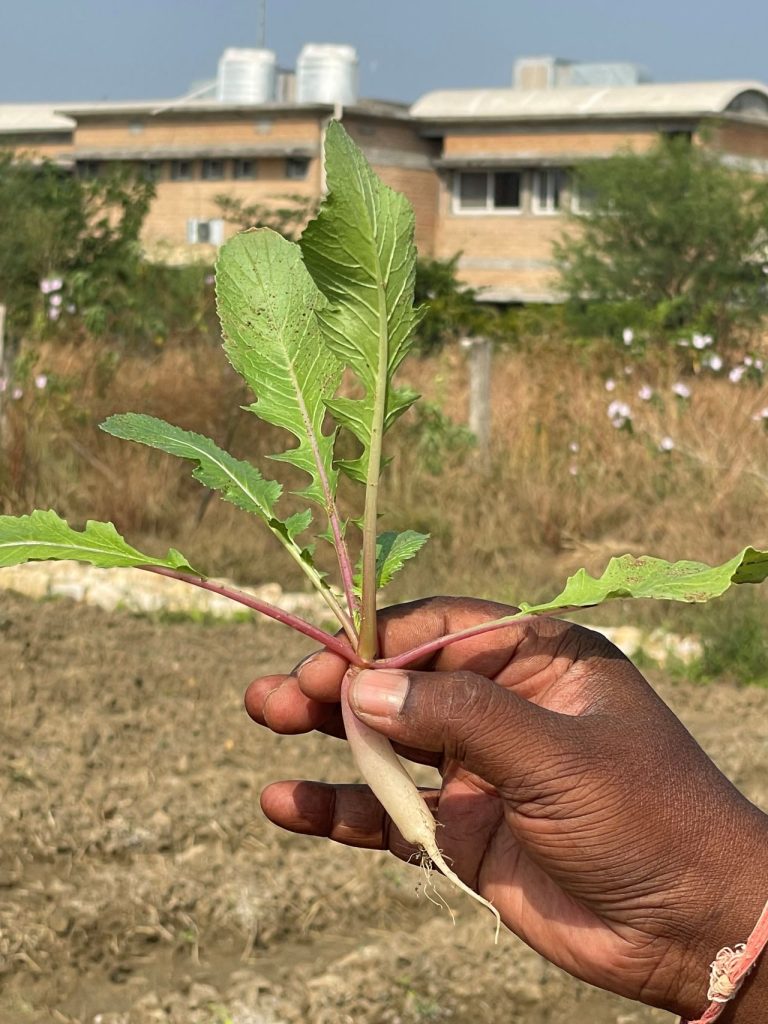
An avid gardener, Chef has his own private garden of seasonal produce, even though there is a larger lush and verdant organic herbal and vegetable garden that is a great place to just forage.
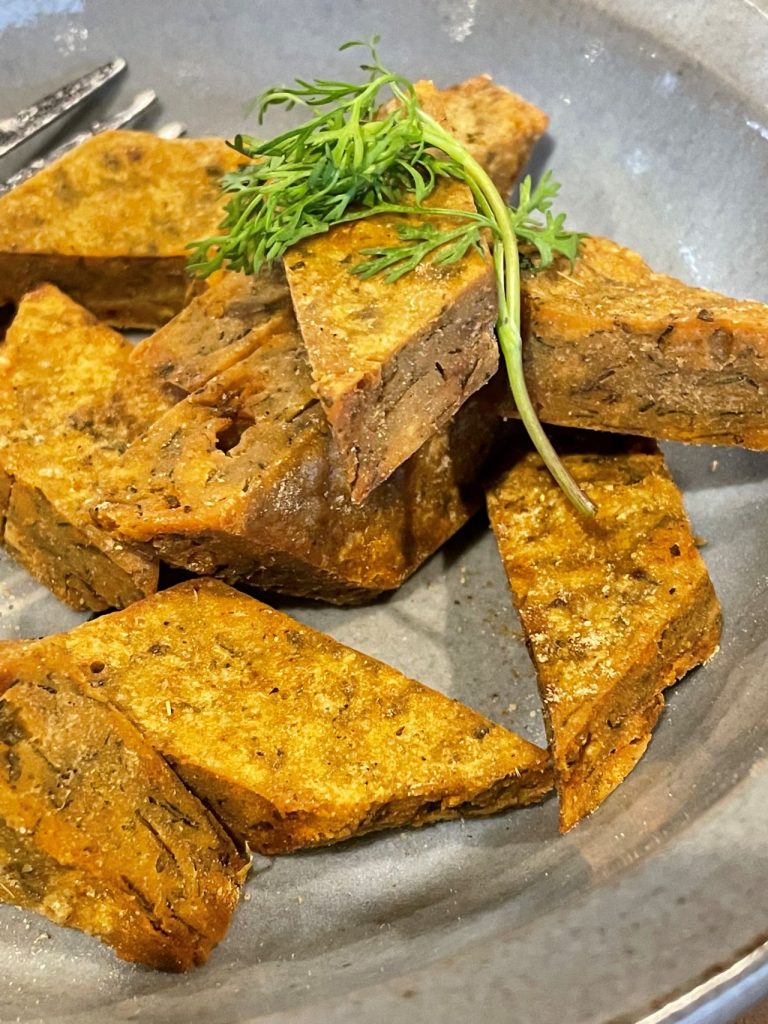
The heart of a destination lies in its local flavours and here the chefs from Waghoba cuisine have rekindled the age-old traditional cuisine from the region. I recommend the delicious Varadhi Thali which has two distinct flavours – the spicy Saoji curries and the milder Varhadi. Our menu also includes the flavoured Patodi Rasaa, a mild spicy gravy with patodi, a dish made with small pieces of cooked chickpea flour or besan. My vegetarian thali offers a plate full of goodness – there is multigrain roti and rice with batata bhindi bhaji, salad, and kadi with jowar papad and spicy garlic chutney powder, For the meat eaters there is dahi mutton. The dessert is a yummy fried modak and for ice cream lovers, there is a selection of flavours that are all made here in the kitchen.
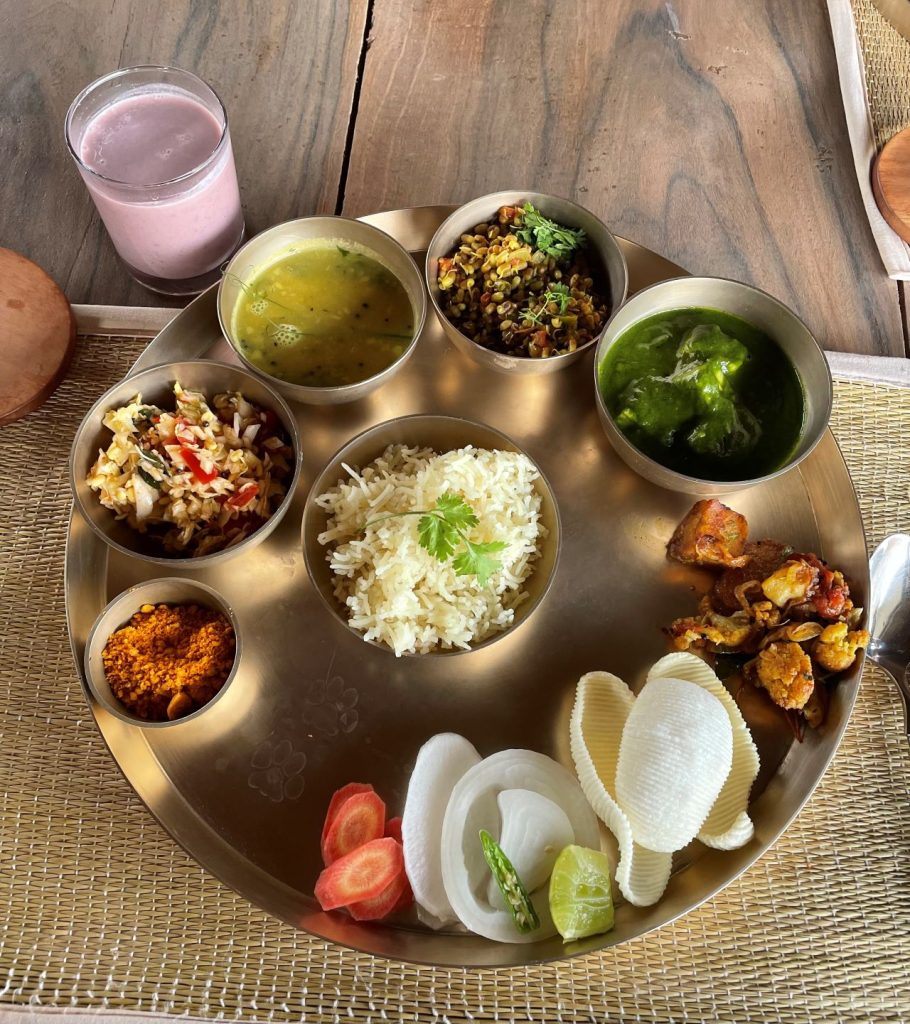
Every meal is special here. Breakfast is usually packed for those heading out for an early morning safari with a combination of local savouries, cookies and fruits. From Johar cheela to kothimbir vada, every dish is local, seasonal, and fresh while the ingredients are sourced locally here including the millets
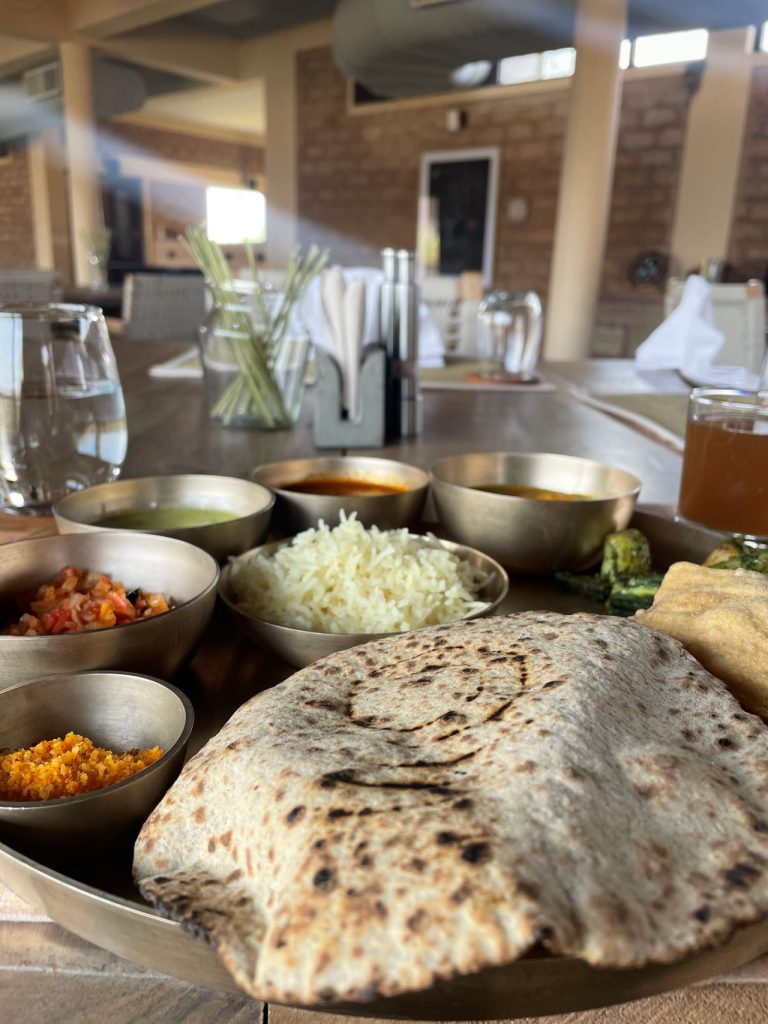
Special meal requirements including allergies are catered to and you can ask for gluten-free meals as well. The lodge prides itself on not adding any refined ingredients or packaged dishes and there are no artificial flavours added to any dish.

Dinners are quieter and you can choose from an array of a la carte menus with Indian or Far Eastern or Continental dishes. If it’s a special occasion, al fresco dinners are also set up at the deck area and by the poolside. But be it the packed breakfast for the safaris, the sumptuous thalis for lunch, or the multicuisine dinner, every meal is a gastronomic experience. I particularly love the soups, which are just heavenly with just the right tinge of spices and flavours. And one of the special highlights for me is the crispy fried dish made with freshly plucked zucchini flowers. There are other evening snacks as well and if you are not on a safari, you are forever eating.
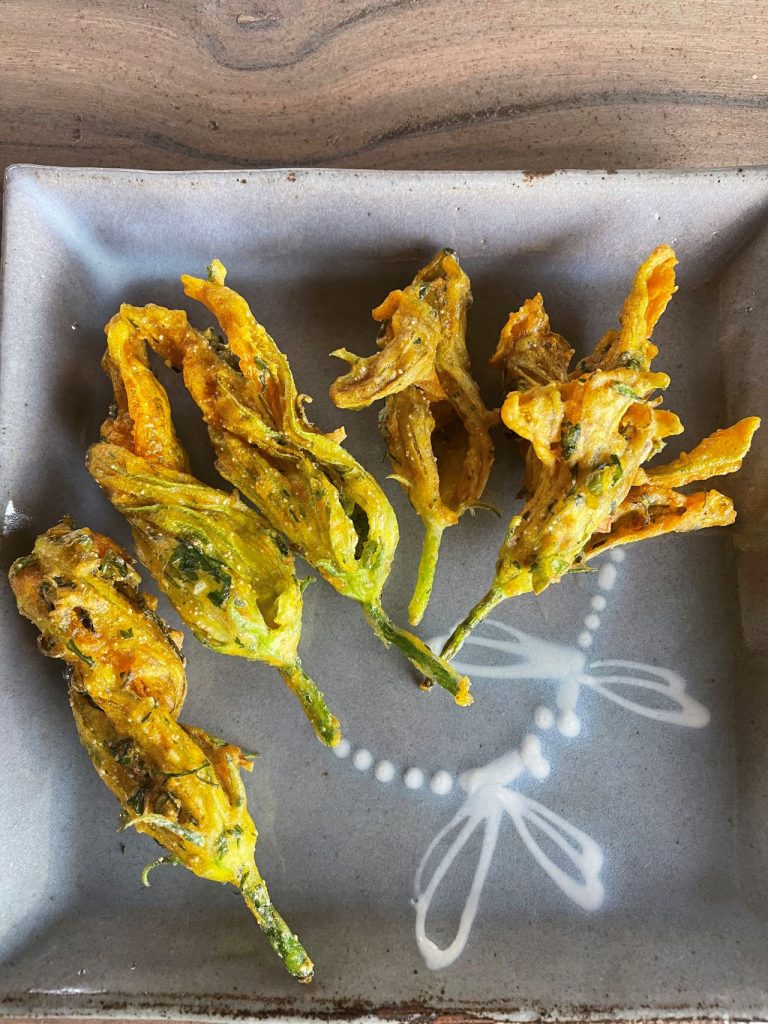
It’s not just the menu that is inspired by local cuisine. Lunch is served in traditional hand-made Kansa thalis while dinner is served in hand-made pottery crafted exclusively for the lodge.
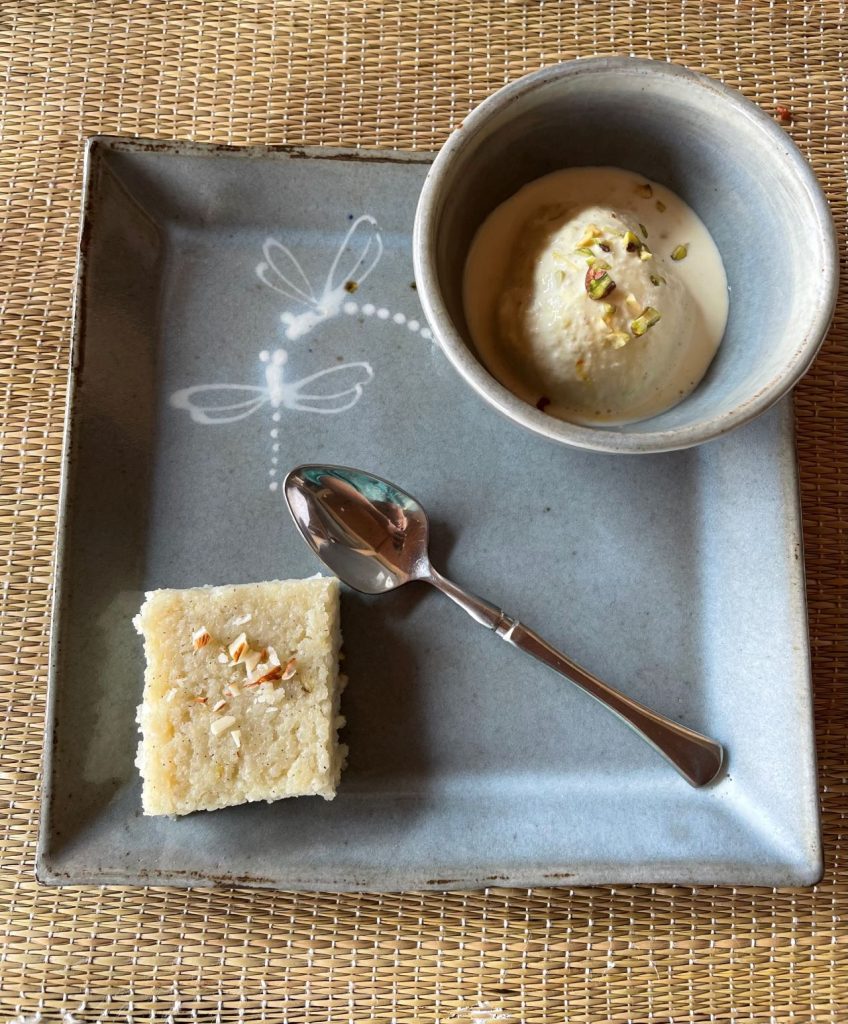
Experiences and Activities
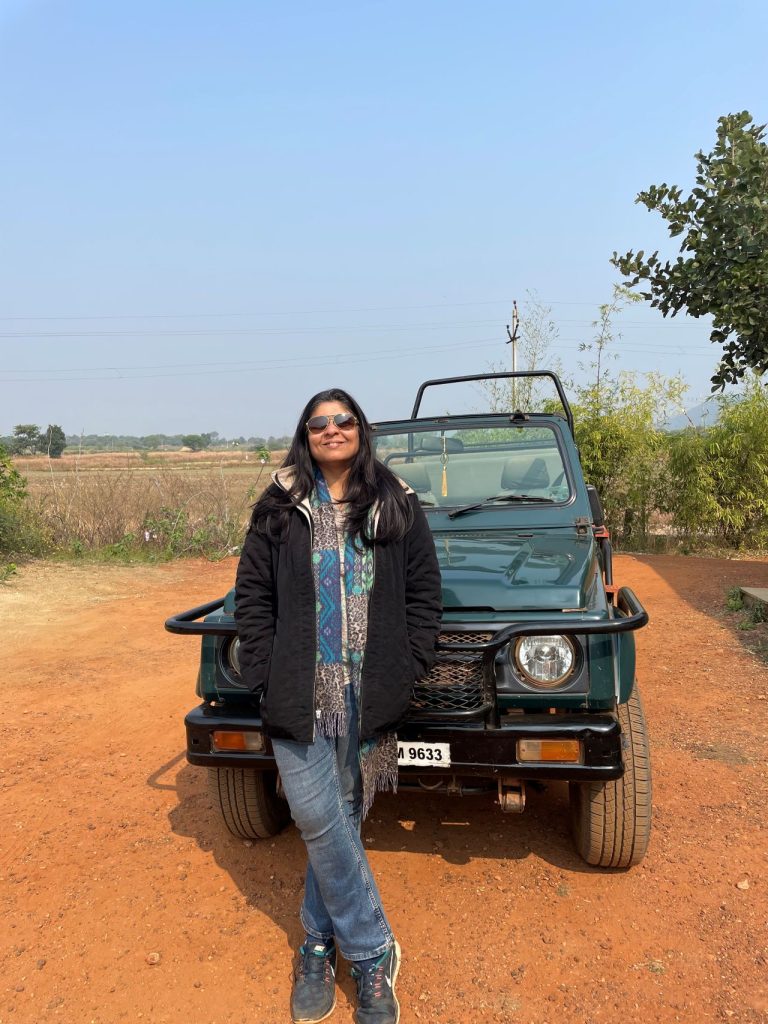
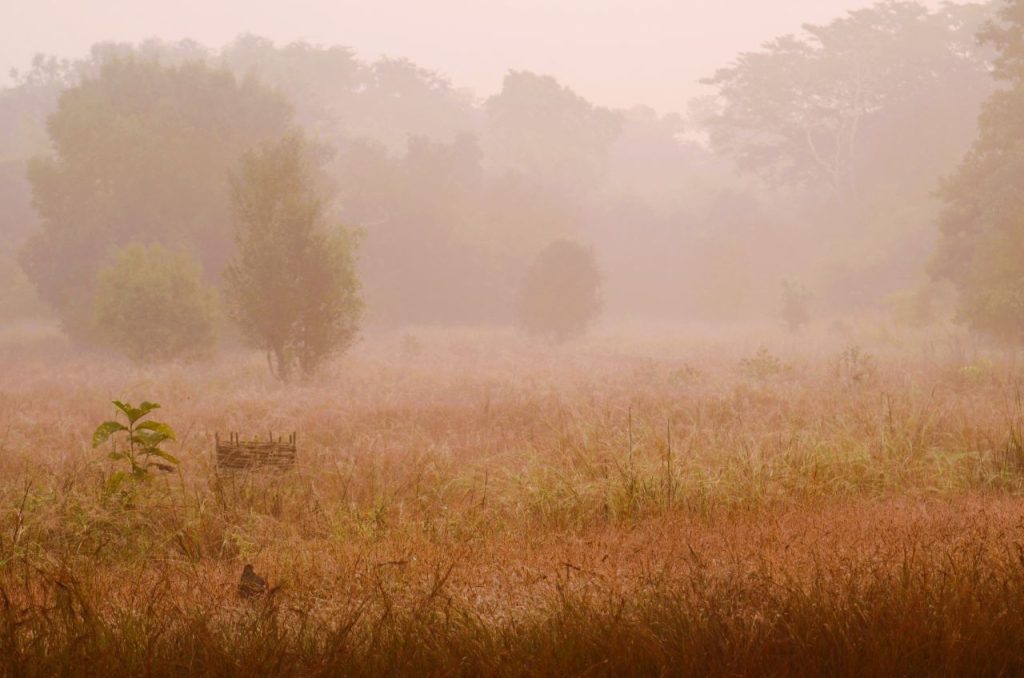
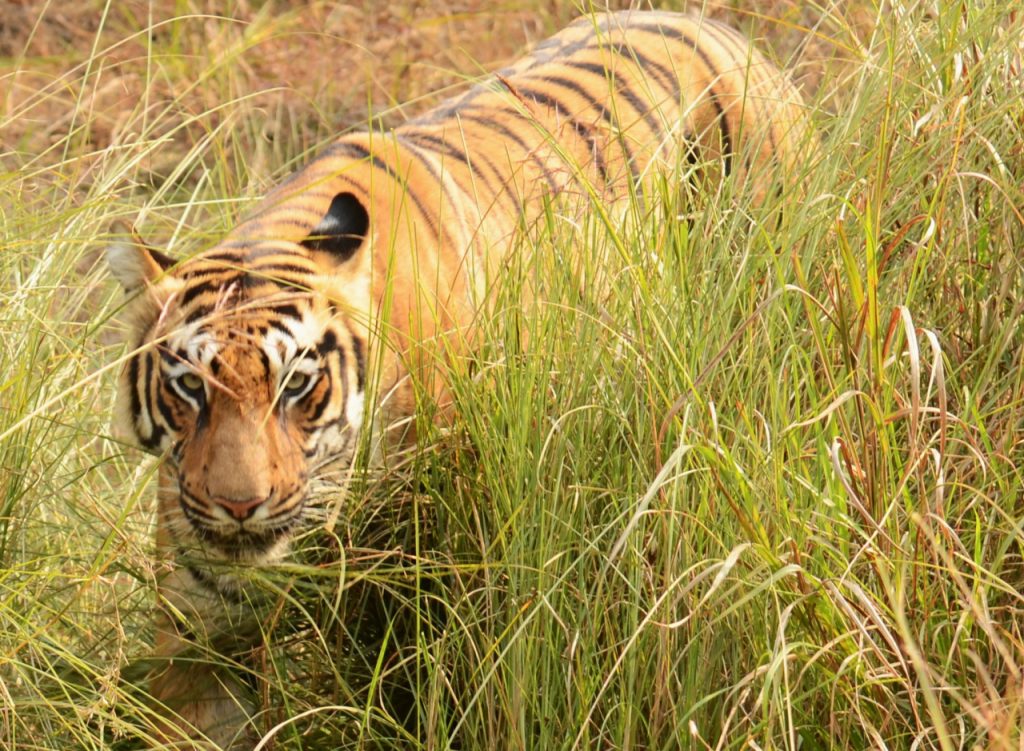
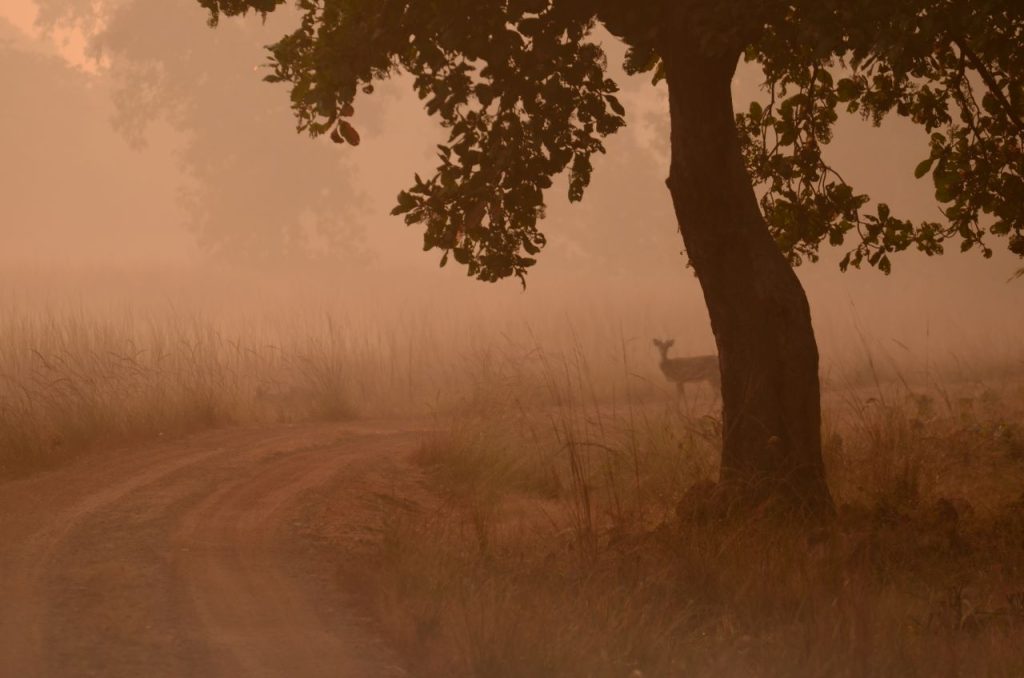
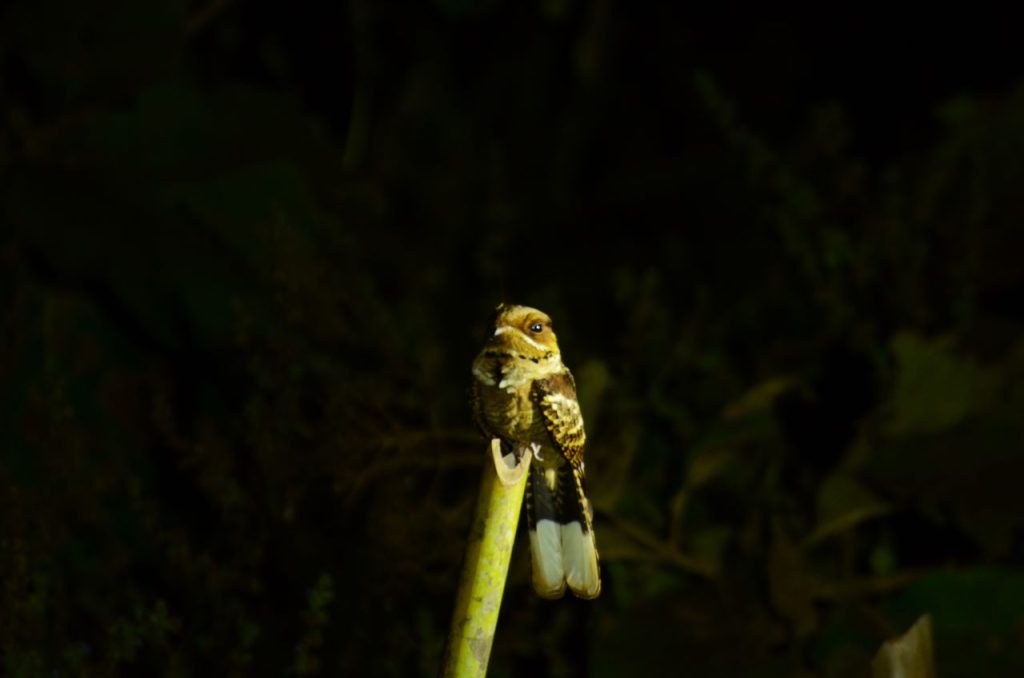
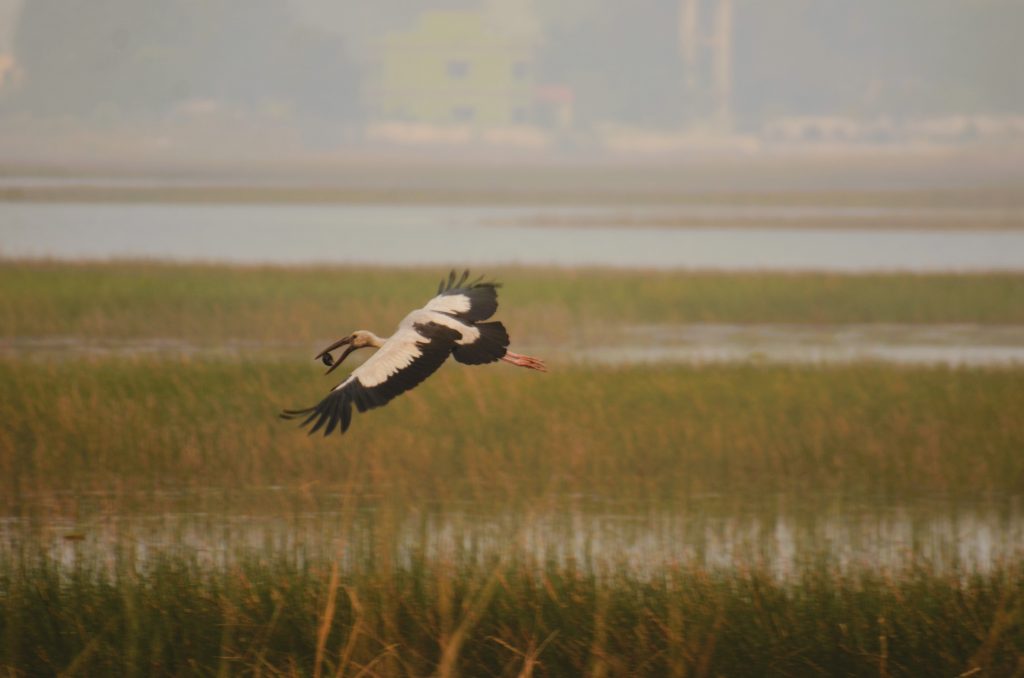
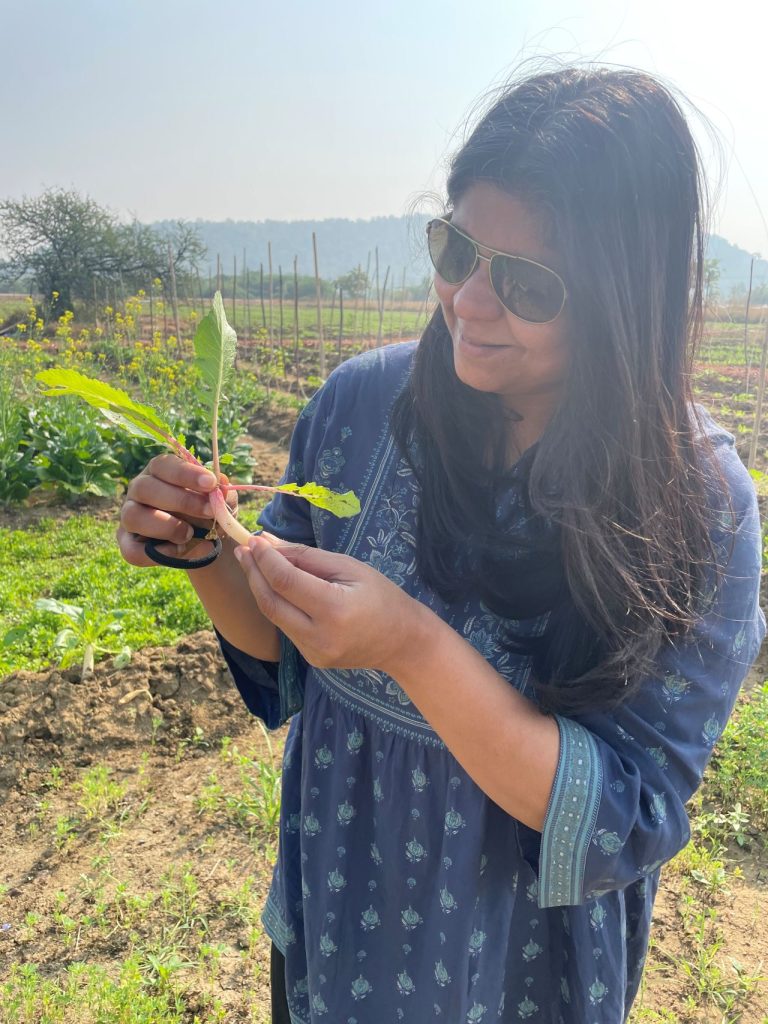
There are also many activities outside the Waghoba Eco Lodge. I will strongly recommend the cruise along the backwaters of the Irai lake and while it is a great way to do some birdwatching, you can also sight crocodiles and if you are lucky, the tiger too.
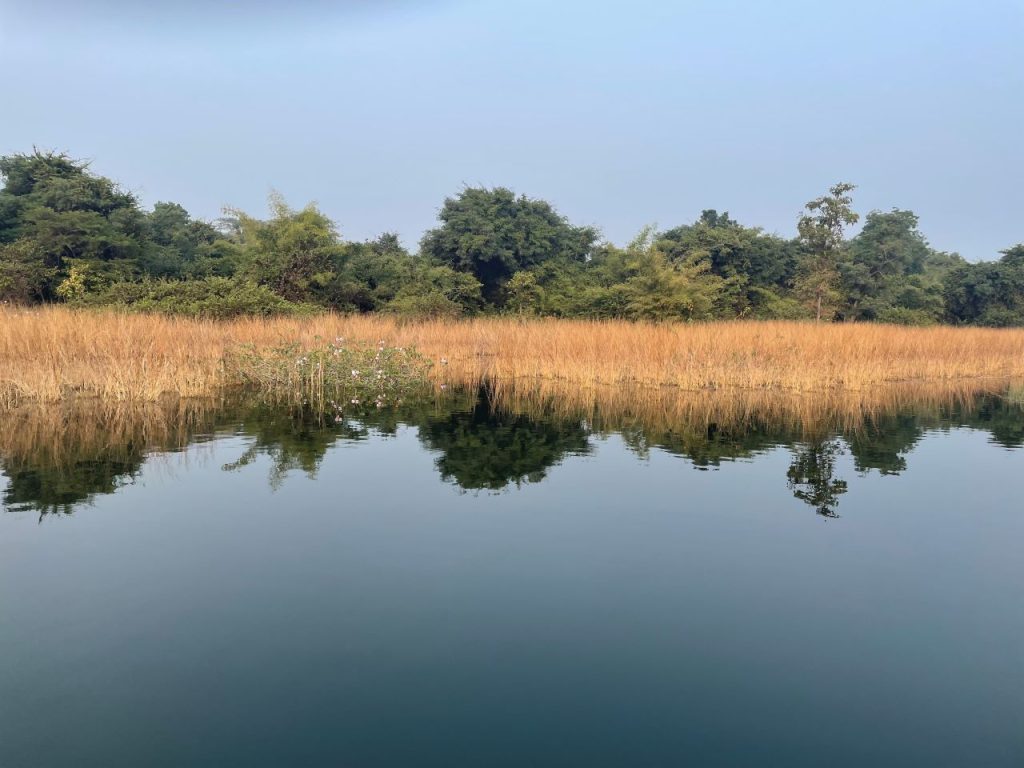

Sustainability
Responsible tourism has been at the very core of their philosophy at Pugdundee Safaris. They are strongly committed to environment and conservation, women empowerment, and creating equal opportunities, sustainability, and social development. They were recognized for their green initiatives with the ICRT Award and Outlook Indian Responsible Tourism Awards in 2022. One of the best sustainable safari lodges among the Tadoba Tiger Reserve Hotels, Waghoba Eco Lodge walks the talk when it comes to wildlife conservation.
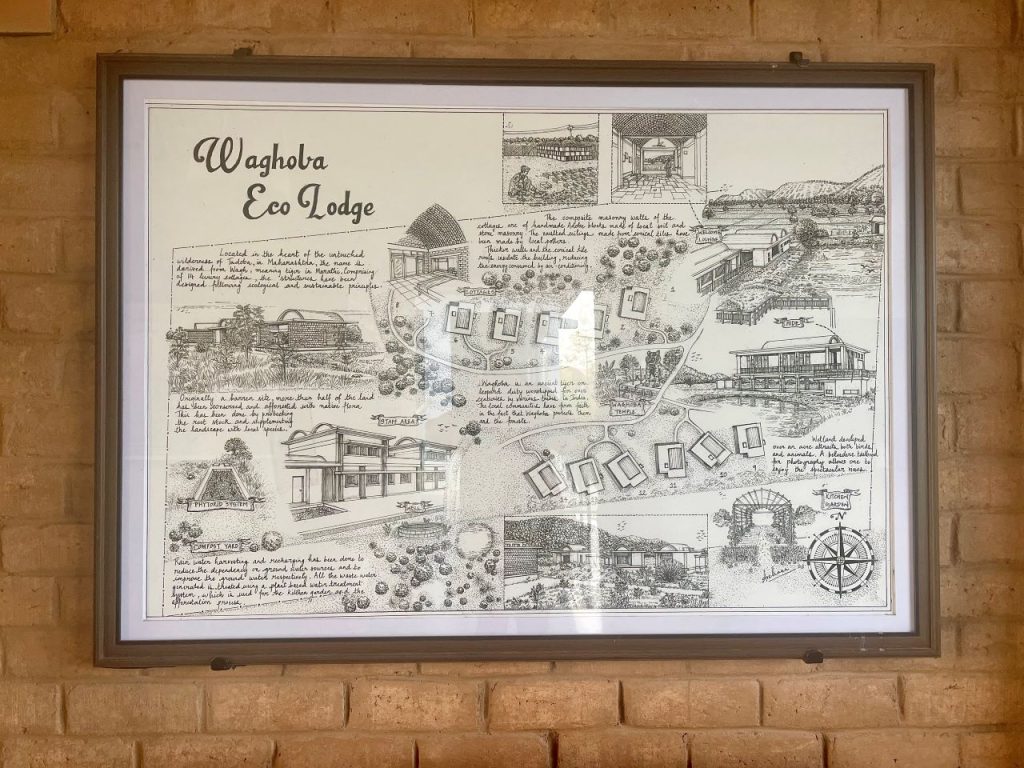
The priority is on green architecture and eco-construction. Handmade conical tiles used in vaulted ceilings with ceramic mosaic on top stabilised adobes or sun-baked mud brick and sandstone on the walls, the flooring with golden brown limestone, and sustainable lighting fixtures – everything is carefully blended together to create a luxurious but sustainable experience.
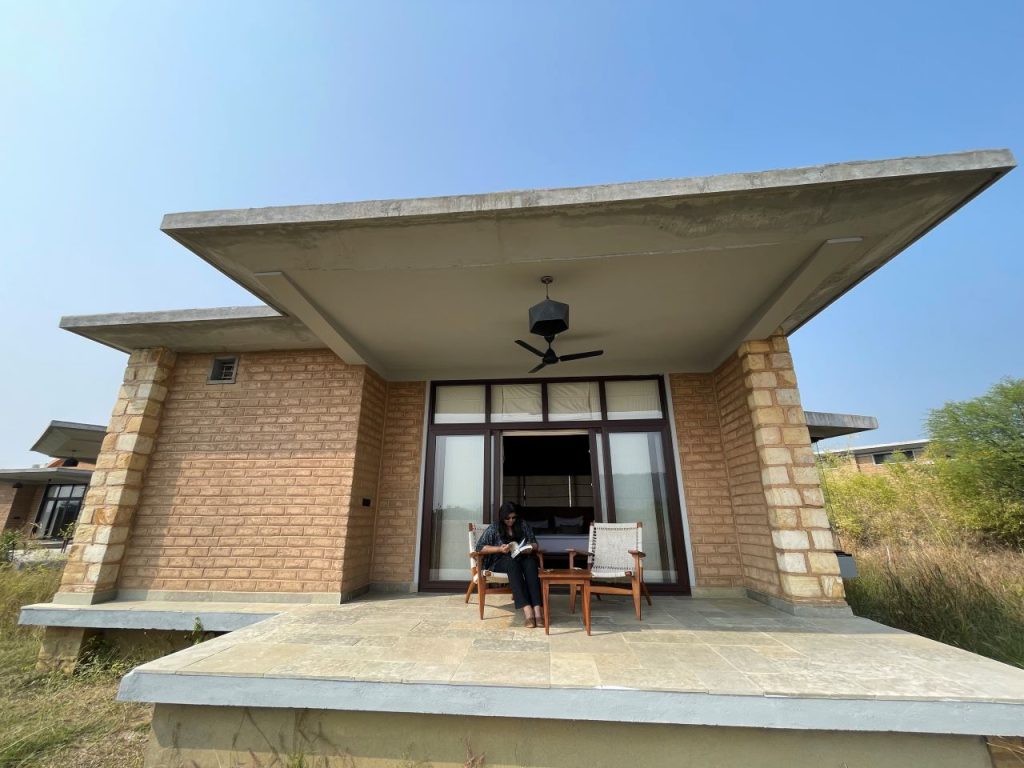
The emphasis is also to reduce the heat in summer and minimize the use of concrete and electricity and keep it minimal and local. But sustainability is also in the minuscule details. While the linen is cotton, the toiletries are organic and no plastic has been used. While recycled steel bottles and bottles are kept in the room for guests, the packaging boxes are plant-based and there are newspaper carry bags and dental kits made with bamboo. Reclaimed teak wood has been used in furniture, terracotta lamps add to the decor creating a natural earthy ambiance.
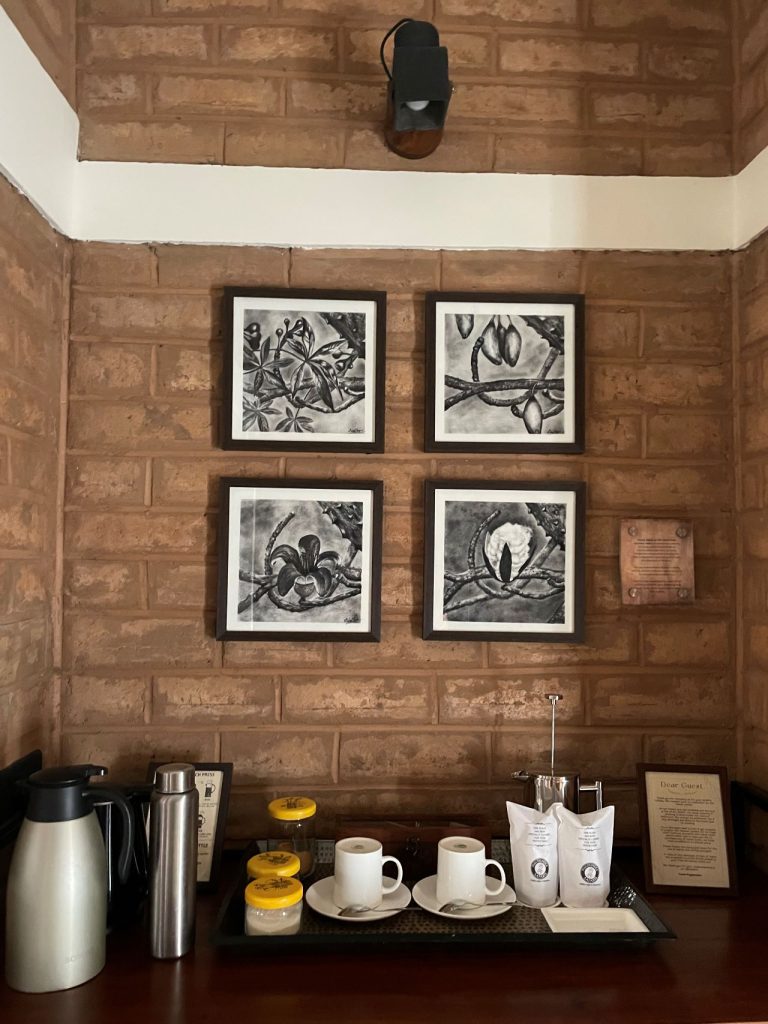
The focus here is on the outdoors and maintaining the biodiversity of the landscape so that lodges are essentially extensions of the wildlife habitat. Invasive and exotic species of flora have given way to native and endemic plants and trees that are part of the original deciduous and bamboo forest. In addition to the rewilding, a green corridor has been created around a semi-arid lake that has been revived. With rainwater harvesting, groundwater recharge, and wastewater treatment, the lake is at the nucleus of the eco-lodge that is focussed on conscious luxury.
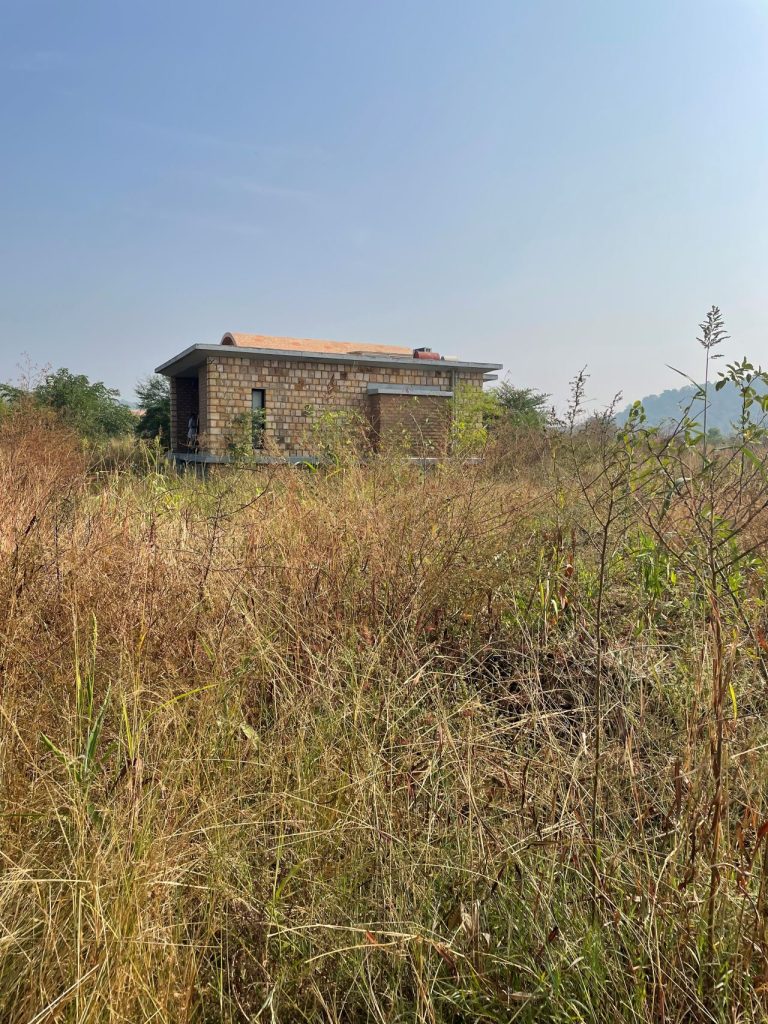
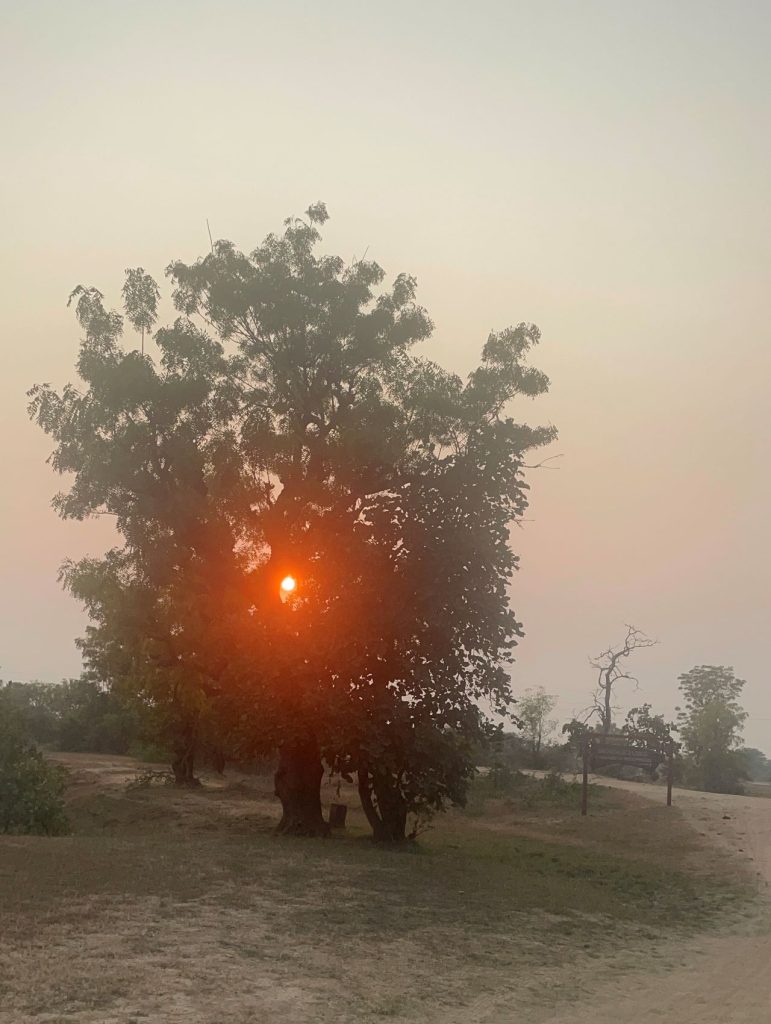
Besides the architecture, the focus has been on growing local produce and reviving age-old culinary traditions, and recreating rustic regional cuisine with a sustainable perspective. The lodge also works with local communities and supports social enterprises, local self-help groups and NGOs and sources products and materials from them, be it cutlery or souvenirs. They also train naturalists and local guides in the national park and empower women and focus on equal livelihood opportunities. All these measures and activities make Waghoba Eco Lodge one of the most sustainable safari lodges among other Tadoba Tiger Reserve hotels and resorts.
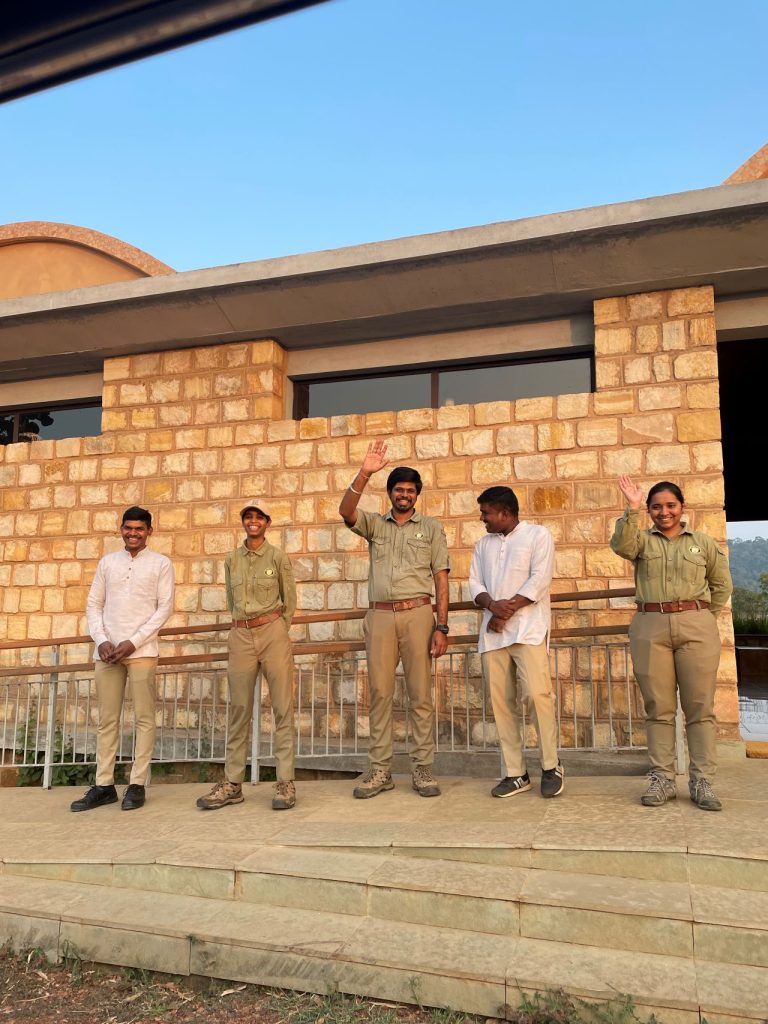
Diksha the young bakery chef discovers her love for baking after she started working here a few months ago. Shek Shaheen, a naturalist moved from Pune and Hyderabad here to follow her passion in wildlife. Shreya Parab’s love for the wilds made her leave the concrete jungle of Mumbai to the eco-friendly lodge here where she is at the front office but is often seen with Diksha baking cakes and cookies as well.
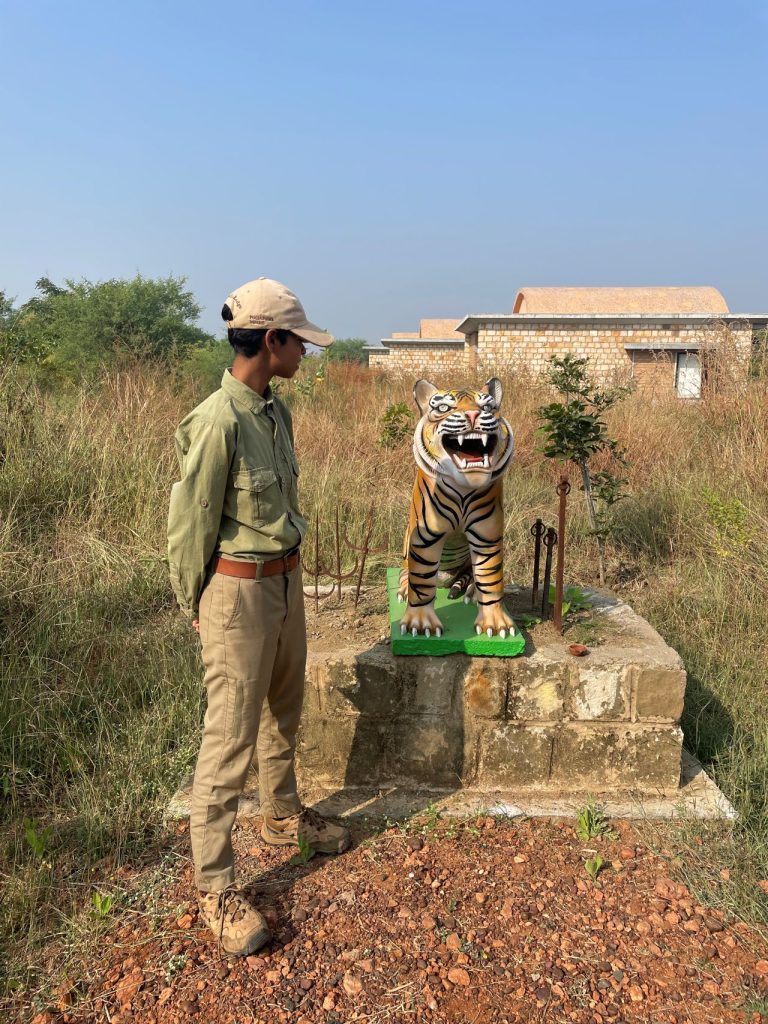
The eventual dream of Pugdundee Safaris is to convert every lodge into becoming carbon neutral in a year and Waghoba Eco Lodge is a very symbol of sustainability and blending in luxury, wildlife, conservation and tourism.
